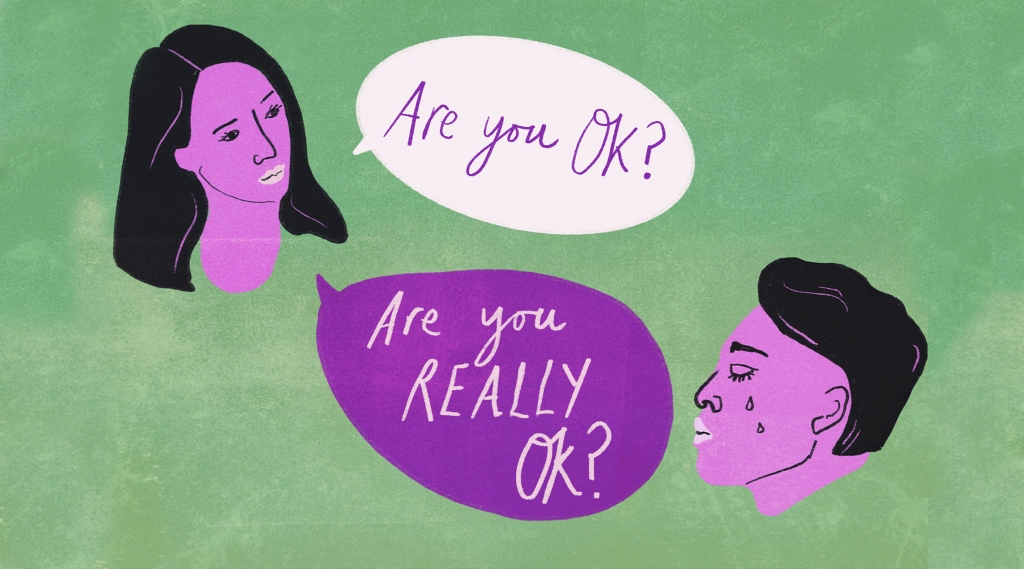
It is a common and harmful misconception that talking about suicide might ‘plant the idea’. Here, Rory O’Connor, author of When It Is Darkest: Why People Die by Suicide and What We Can Do to Prevent It, explains why that’s not the case – and offers tips for speaking about it to loved ones, should you ever need to.
I recently took part in the British DJ Roman Kemp’s BBC documentary Our Silent Emergency on mental health and suicide prevention, which saw Roman travel up and down the country, meeting people who have been suicidal or lost a loved one to suicide, as well as speaking to those working at the frontline, supporting people in crisis. The programme was personal for Roman, as he was trying to come to terms with the death by suicide of Joe, one of his closest friends. He also talked movingly about his own mental health struggles, and came to Glasgow to meet me to try to make sense of the tragedy of suicide.
In the film, Roman met a group of young people whose mantra, when it comes to discussing suicide, is ‘Always ask twice’. This is such a brilliant message, as it is so easy to simply say ‘I’m fine’ when asked ‘Are you okay?’ on the first occasion, but it is much more difficult to dismiss if you are asked ‘Are you really okay?’ a second time. Asking twice transcends a specific and harmful myth related to suicide: that asking a friend or family member about suicide plants the idea in someone’s head.
I know, from 25 years of working in suicide research and prevention, that this is a widely held myth, still today. So let’s be crystal clear: asking someone whether they have thoughts of suicide does not plant the idea into their head. Rather, it could be the start of a life-saving conversation that gets them the help or support that they need.
Of course, asking the question is scary, and our biggest fear is that the answer comes back as yes. In my experience, as long as we ask the question sensitively and respond with compassion, we will not do any harm. Indeed, often the person feels an incredible sense of relief that someone has noticed that they are struggling.
Something I believe firmly is something I said both in the film and in my book: that suicide is preventable right up until the final moment. This is such an important message, because the reality is that suicide is never inevitable, and although it can be so difficult to see a time when their mental pain will end when someone is in the depths of despair, it can and will end.
My heart breaks, however, for the 800,000 people across the globe each year whose pain becomes so overwhelming that suicide is their permanent means of ending their pain. If you are struggling, please try to hold on to life, as thoughts of suicide come in waves of intensity, which means that they do dissipate, becoming more manageable with time. Also, there is support out there, so please reach out. In When It Is Darkest, drawing upon people’s real-life stories as well as the latest research evidence, I try to convey the waxing and waning nature of suicidal thoughts and the pathways to suicide.
If you are concerned about a friend’s or a family member’s wellbeing, I’d really encourage you to ask someone directly about suicide. This is especially important if they are talking about feeling trapped, defeated or a burden to others – as these are warning signs for suicide.
‘Asking the question is scary, [but] often the person feels an incredible sense of relief that someone has noticed that they are struggling’
Here are a few tips which I discuss in the book which may be helpful to bear in mind when asking about suicide:
• Try not respond with shock, or disbelief and try not to minimise how they are feeling if they disclose suicidal thoughts or feelings. People who are suicidal often conceal their pain and feel a sense of shame, so anything we can do to help them to feel more connected, valued and less stigmatised could be life-affirming.
• You don’t need to solve their problems; simply listening and showing compassion can be so important and containing. It is also worth remembering that recognising their pain, validating how they are feeling and acknowledging that it must be difficult for them can be so powerful.
• If they do disclose that they have thoughts of ending their life, consider asking them if they are able to keep themselves safe and encourage them to seek help, perhaps from a professional if they are in acute distress. (If not, ask them to contact their GP or if it is okay for you to do so – and if the person is at imminent risk of suicide, don’t hesitate to contact the emergency services.)
Finally, I have lost count of the number of people I’ve met who have asked the ‘Big S’ question (‘Are you thinking of suicide?’), and despite being reticent to do so at the time, are now convinced that if they had not, their loved one would be dead.
So, please reach in. If you are concerned about a loved one, ask them directly whether they are having thoughts of suicide; it genuinely could save their life. But also, please look after yourself and your own mental health; we cannot support others if we don’t take care of ourselves.
Image: Alicia Fernandes/Penguin
Article by: Penguin Random House
Source: https://bit.ly/3sfJRcV